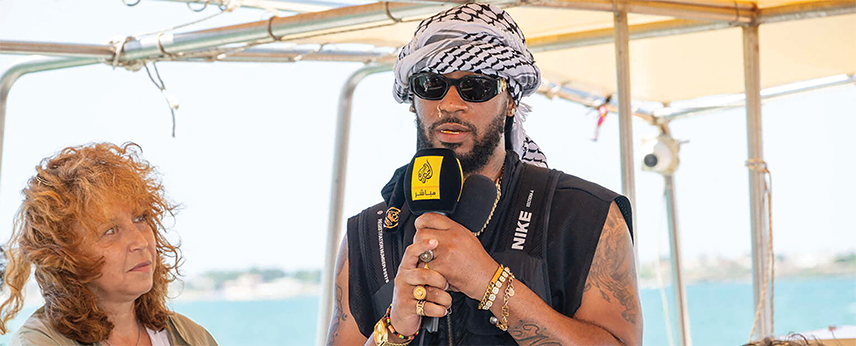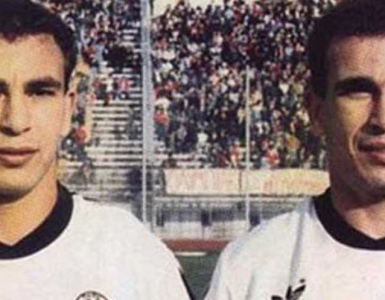MISSION: The Amazon Labour Union leader exemplifies how Black and Palestinian freedom struggles have converged throughout history.
By Sonali Kolhatkar
Black and Brown [people] always stood together in struggles from the beginning of time,” said Christian Smalls, explaining his pro-Palestinian activism. The Amazon Labour Union leader spoke to me on July 24 2025, from the Handala, a ship bound for Gaza bearing medical supplies and baby formula.
“Palestinians, they are right in our communities. They are our brothers and sisters, they are our neighbours, and we love one another … we [are] standing together side by side in this struggle to end this illegal siege that Israel has imposed,” Smalls said. His goal in sailing to Gaza was to highlight Amazon’s cloud computing contracts with Israeli weapons manufacturers, as well as to urge labour unions in the United States to block arms shipments to Israel, as Greek dockworkers recently did.
Unlike many who, after nearly two years of silence, are now speaking up against Israel’s forced famine in Gaza, Smalls has been committed to Palestinian liberation for years. Just after Israel began its latest genocidal chapter in Gaza in October 2023, the labour activist posted a message of solidarity on social media saying, “The people united will never be defeated so yes it’s Free Palestine because we’re not Free until we’re all Free from the river to the Sea!”
And when college students across the U.S. launched powerful Gaza-solidarity campus protests in 2024, the New Jersey-based Smalls showed up at Columbia University’s campus, giving speeches and supporting students.
“I visited many campuses across the world,” he said. “The younger generation is not going to give up.”
Within days of our conversation, Israeli forces boarded the Handala and seven of them assaulted Smalls — the only Black activist on board. According to the Gaza Freedom Flotilla, “They choked him and kicked him in the legs, leaving visible signs of violence on his neck and back … This level of force was not used against other abducted activists.”
While horrific, Smalls’s assault was not surprising. “As a Black man in America, I guess I’m born with a target on my back,” he said. “This is not my first rodeo going up against the status quo.”
Black people in the U.S. and Palestinians in Gaza and the occupied West Bank face similar tactics from armed agents of the state. That’s no coincidence. There is a long history of U.S.-Israeli joint police training; a 2018 report by Jewish Voice for Peace detailed how Palestinians face the same sort of systematic racial profiling and violence from Israeli forces as Black and Brown Americans do at the hands of U.S. police.
“People had no idea that Israeli military and United States police officers were training together and sharing technologies,” said Ijeoma Oluo, a writer, speaker, and best-selling author of So You Want to Talk About Race.
“Every justification used for [Israel’s] genocide is also used against us, and used to justify locking our people in prisons. It’s used every time that a Black person is killed by police,” Oluo pointed out.
It’s not just the similarities in being victimized by harsh policing; it’s also an intimate understanding of the horrors of colonisation that ties the two communities together.
Acclaimed author and social justice activist adrienne maree brown sees the indisputable cruelty of Israel’s colonisation clearly. “The idea that like, I need to go from where I am … and I need to go to another place where people are, and I need to take over that place, and then that’s gonna be how I have my safety and my abundance — like, it’s such a delusional thought,” said brown.
An August 2025 Economist/YouGov poll found that 33 percent of Black Americans sympathized with Palestinians. And 47 percent of Black people polled wanted the U.S. to decrease military aid to Israel while 40 percent supported increasing aid to Palestinians — the largest fractions of any racial group.
“It’s remarkable the solidarity that you see, that people of colour feel … towards Palestinians,” brown said. “Even if we don’t know too many details about the issue, it seems very obvious to us, any of us who’ve come from lands that have once been colonised, or … been part of communities that have faced erasure.”
That solidarity has seeped into mainstream culture too. Grammy Award-winning singer and rapper Doechii used her BET award acceptance speech in June 2025 to “speak up for all oppressed people,” including “the people in Gaza.” She has since continued speaking up, chanting, “Free Palestine” on her Instagram live shows.
There is a sense among some people of colour that if Israel succeeds in wiping Palestine off the map, they themselves may be next. Conversely, beating Israel back would be a blow to modern-day colonialism. “Oppressive powers [are] coming together and saying, this must succeed, this genocide must be allowed to continue,” Oluo said. “They understand that the more that we know how these systems work together, the more that we can see the ties of capitalism and global colonialism into this violence and oppression.”
Israel’s apartheid agenda has been symbolic of Western hegemony for decades. It’s no wonder that links between Black Americans and Palestinians have deep roots. Khury Petersen-Smith, the Michael Ratner Middle East Fellow at the Institute for Policy Studies, has been a leading voice in the Black4Palestine network and pointed out how “our freedom struggles converge … And that has happened throughout history.”
When African nations were in the process of decolonising in the 1950s and ‘60s, “Palestinians were in alignment with those decolonization struggles,” Petersen-Smith said, while “Israel was lined up with the United States, with South Africa, with European powers.” As part of his internationalist work with Black anti-colonial leaders, Malcolm X visited Jerusalem in 1959 and Gaza in 1964, and later denounced Zionism as a “new form of colonialism.”
More recently, the uprising in Ferguson, Missouri, sparked by the police-perpetrated killing of Mike Brown, a Black teenager, coincided with one of Israel’s ongoing wars on Gaza. The two exercises in state violence taking place in summer 2014, on opposite sides of the planet, prompted many comparisons between the plight of both people.
The 2014 uprising “was this moment of horror and violence, but also resistance and solidarity,” said Petersen-Smith. “Black folks rose up in Ferguson, and Palestinians in Palestine sent messages of solidarity, sent statements of solidarity and sent suggestions on social media about how to deal with tear gas and things like that.” Black delegations even travelled to the occupied West Bank that year to witness first-hand the links between the two communities.
Similarly, when George Floyd’s 2020 murder in Minneapolis precipitated a historic racial justice uprising across the U.S., Palestinians once again offered Americans advice via social media on how to treat the effects of tear gas and avoid rubber bullets.
Setting aside the historical and contemporary threads stitching together Black people and Palestinians, there’s also basic human empathy at work.
Smalls, who had pledged to go on hunger strike while in Israeli custody, explained that, “as a father of three beautiful children, I cannot live and see every day … babies and women and children and innocent Palestinians being killed and slaughtered.” He added, “I don’t want to see my children grow up in the world that we are experiencing right now.”
Smalls returned to the U.S. on July 31, receiving a hero’s welcome at the airport in New York as he walked into a crowd of activists chanting “Gaza.” The Palestinian Youth Movement released a statement calling him “an example to us all of principled comradeship, courage, and solidarity with the oppressed.” – Truthout
* Sonali Kolhatkar is an award winning multimedia journalist and author. She is the host and executive producer of YES! Presents: Rising Up With Sonali, a nationally syndicated weekly television and radio program airing on Pacifica stations and Free Speech TV.


































